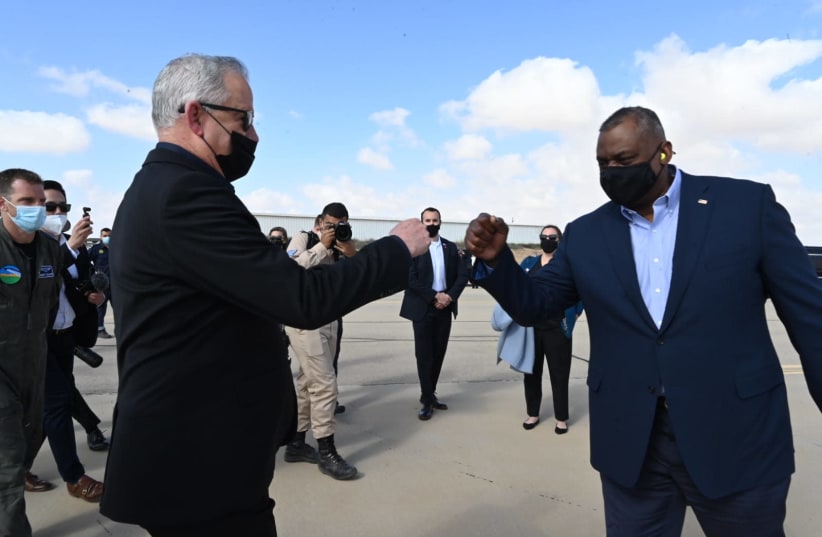Tehran’s continued nuclear activity imperils the viability of the Iran deal, US Defense Secretary Lloyd Austin told a security conference in Bahrain in advance of the resumption of talks to revive the deal scheduled for November 29 in Vienna.
“Iran’s actions in recent months have not been encouraging – especially because of the expansion of their nuclear program,” Austin told the IISS Manama Dialogue, during a major policy address on America’s role in the Middle East.
He focused in part on Tehran’s nuclear ambitions and the Biden administration’s push to restore the 2015 Joint Comprehensive Plan of Action to constrain that activity. The US exited the JCPOA, known as the Iran deal, in 2018 under direction from former US President Donald Trump.
“Iran’s nuclear activities are bringing us closer to the point at which returning to the JCPOA won’t recapture its benefits,” Austin said.
Should Iran change its course and come to Vienna with constructive positions,” Austin said, he believes that Washington and Tehran “could quickly resolve our lingering differences to make a mutual return to the JCPOA possible.”
Israel has opposed the deal, which it believes does not prevent Iran from ultimately producing a nuclear weapon, while at the same time emboldens Iran’s global terrorism and regional activity.
The Biden administration has put the deal forward as the best plan of action possible, while at the same time noting that the deal’s relevancy was expiring and warning that the administration would act against the Islamic Republic if necessary.
“But if Iran isn’t willing to engage seriously, then we will look at all the options necessary to keep the United States secure,” Austin said.
The security issues with Iran, he said, go well beyond its nuclear program.
“Iran stokes tensions in this region and beyond, and that undermines peace and stability for us all,” Austin said.
The defense secretary stressed that the US “commitment to Israel’s security is ironclad.” He also spoke of the importance of resolving the Israeli-Palestinian conflict and the significance of regional unity.
Austin alluded to the Abraham Accords, under which Israel normalized ties with the United Arab Emirates, Bahrain, Morocco and Sudan.
“Just look at the new relationships being forged today by Israel, Bahrain, the UAE, Morocco, and other [places] – opening up new opportunities for shared responsibility, shared prosperity, security cooperation and people-to-people ties,” Austin said.
A regional response is needed to counter regional threats, he said.
“Many of the region’s most urgent security threats transcend borders – and it means tackling them through determined multilateral efforts.”
Austin acknowledged in a speech the regional and global concern that the United States was solely focused on China’s challenge and had shifted its focus away from the Middle East, particularly in light of its withdrawal this summer from Afghanistan.
“Let’s be clear: America’s commitment to security in the Middle East is strong and sure,” Austin said.
“We’ll defend our interests in this region. And we’ll continue to evaluate the right mix of forces to bolster our deterrence against Iran,” he said.
“We’ll protect our forces from attack by Tehran or its proxies. We’ll work together to ensure that ISIS can’t reconstitute itself in Iraq and Syria,” Austin said.
“And we’ll continue to support freedom of navigation in the region’s vital waterways. We’ll drive to end lingering conflicts. And we’ll keep up our relentless focus on counterterrorism, even as we shift to an over-the-horizon concept in Afghanistan.”
Gulf Arab states, heavily reliant on the US military umbrella, have expressed uncertainty about Biden’s focus on the region, especially after America’s withdrawal from Afghanistan. They are now closely watching efforts to revive the global-powers’ nuclear pact with Iran.
Gulf states have asked that any deal should address what they call Iran’s ballistic missile program and destabilizing behavior in the region.
Jon Alterman of the Washington CSIS think tank said that “there’s dismay that the United States is on its way out the door. I’m not sure that messaging addresses that sense of impending American abandonment.”
A senior US defense official, speaking on condition of anonymity, said Austin was not expected to make new commitments in the region during his trip.
Saudi Arabia, one of Washington’s closest regional allies, has been frustrated by the approach of Biden’s White House, which has pressed Riyadh to improve its human rights record and end the war in Yemen.
Former Saudi intelligence chief Prince Turki al-Faisal, attending the Manama security forum, welcomed verbal assurances but said that “demonstrative actions are equally important,” citing the need to prevent Yemen’s Iran-aligned Houthis from obtaining arms. Washington is pressing Riyadh to lift a coalition blockade on Houthi-held areas, a condition from the group for ceasefire talks.
Austin was set to visit Saudi Arabia in September but the trip was postponed at the last minute. He will not be visiting Riyadh on this trip.
Reuters contributed to this report.
